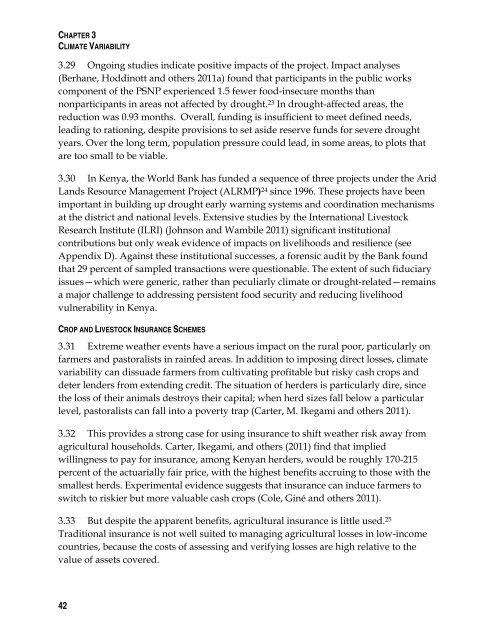Adapting to Climate Change: Assessing the World Bank Group ...
Adapting to Climate Change: Assessing the World Bank Group ...
Adapting to Climate Change: Assessing the World Bank Group ...
Create successful ePaper yourself
Turn your PDF publications into a flip-book with our unique Google optimized e-Paper software.
CHAPTER 3CLIMATE VARIABILITY3.29 Ongoing studies indicate positive impacts of <strong>the</strong> project. Impact analyses(Berhane, Hoddinott and o<strong>the</strong>rs 2011a) found that participants in <strong>the</strong> public workscomponent of <strong>the</strong> PSNP experienced 1.5 fewer food-insecure months thannonparticipants in areas not affected by drought. 23 In drought-affected areas, <strong>the</strong>reduction was 0.93 months. Overall, funding is insufficient <strong>to</strong> meet defined needs,leading <strong>to</strong> rationing, despite provisions <strong>to</strong> set aside reserve funds for severe droughtyears. Over <strong>the</strong> long term, population pressure could lead, in some areas, <strong>to</strong> plots thatare <strong>to</strong>o small <strong>to</strong> be viable.3.30 In Kenya, <strong>the</strong> <strong>World</strong> <strong>Bank</strong> has funded a sequence of three projects under <strong>the</strong> AridLands Resource Management Project (ALRMP) 24 since 1996. These projects have beenimportant in building up drought early warning systems and coordination mechanismsat <strong>the</strong> district and national levels. Extensive studies by <strong>the</strong> International Lives<strong>to</strong>ckResearch Institute (ILRI) (Johnson and Wambile 2011) significant institutionalcontributions but only weak evidence of impacts on livelihoods and resilience (seeAppendix D). Against <strong>the</strong>se institutional successes, a forensic audit by <strong>the</strong> <strong>Bank</strong> foundthat 29 percent of sampled transactions were questionable. The extent of such fiduciaryissues—which were generic, ra<strong>the</strong>r than peculiarly climate or drought-related—remainsa major challenge <strong>to</strong> addressing persistent food security and reducing livelihoodvulnerability in Kenya.CROP AND LIVESTOCK INSURANCE SCHEMES3.31 Extreme wea<strong>the</strong>r events have a serious impact on <strong>the</strong> rural poor, particularly onfarmers and pas<strong>to</strong>ralists in rainfed areas. In addition <strong>to</strong> imposing direct losses, climatevariability can dissuade farmers from cultivating profitable but risky cash crops anddeter lenders from extending credit. The situation of herders is particularly dire, since<strong>the</strong> loss of <strong>the</strong>ir animals destroys <strong>the</strong>ir capital; when herd sizes fall below a particularlevel, pas<strong>to</strong>ralists can fall in<strong>to</strong> a poverty trap (Carter, M. Ikegami and o<strong>the</strong>rs 2011).3.32 This provides a strong case for using insurance <strong>to</strong> shift wea<strong>the</strong>r risk away fromagricultural households. Carter, Ikegami, and o<strong>the</strong>rs (2011) find that impliedwillingness <strong>to</strong> pay for insurance, among Kenyan herders, would be roughly 170-215percent of <strong>the</strong> actuarially fair price, with <strong>the</strong> highest benefits accruing <strong>to</strong> those with <strong>the</strong>smallest herds. Experimental evidence suggests that insurance can induce farmers <strong>to</strong>switch <strong>to</strong> riskier but more valuable cash crops (Cole, Giné and o<strong>the</strong>rs 2011).3.33 But despite <strong>the</strong> apparent benefits, agricultural insurance is little used. 25Traditional insurance is not well suited <strong>to</strong> managing agricultural losses in low-incomecountries, because <strong>the</strong> costs of assessing and verifying losses are high relative <strong>to</strong> <strong>the</strong>value of assets covered.42

















